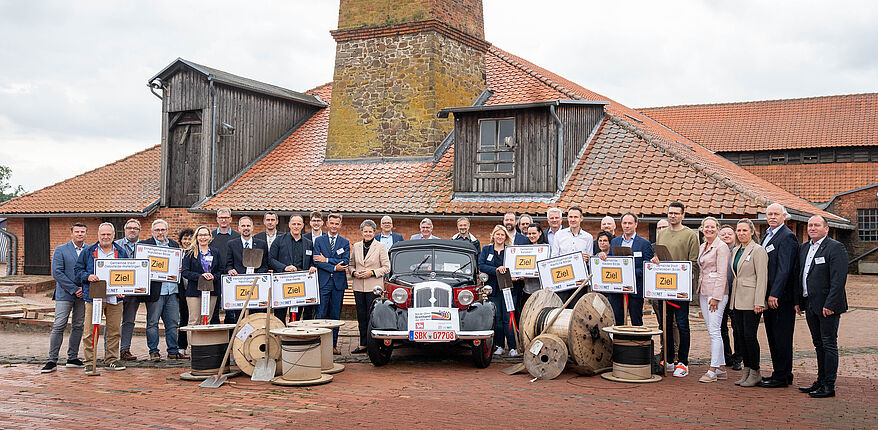One of the largest fibre optic broadband networks in Saxony-Anhalt has been realised in the Börde district. In future, 7,000 kilometres of laid fibre optic network will enable data transmission at the "speed of light" in the Börde district. Around 40,000 customers will now have the opportunity to use a genuine giga network. Around 5,600 companies will then also be able to reliably utilise the highest bandwidths. Private customers will have 500 Mbit/s as standard and companies up to 10,000 Mbit/s. The new fibre optic network makes it possible for all schools and public facilities, as well as the so-called "last milk can", to be supplied via the Giga network.
An investment sum of 225 million euros, 125 million euros from federal funding, 1,500 kilometres of civil engineering, 2,700 kilometres of empty conduits, 7,000 kilometres of fibre optic cable and 40,000 connections in the funded area speak for sustainable investment. It is one of the largest and certainly most sustainable infrastructure projects that has been initiated in this district. Gruber says: "These figures make us proud," says Dr Denis Gruber, the district's head of infrastructure and environment. "Behind these figures is a great deal of hard work, communication, perseverance, effort, commitment, conflict resolution and, above all, an unwavering optimism to do something good and sustainable for this region, literally to connect this region with broadband." Digitalisation is bringing about a change that entails major challenges in all areas.
In order to pave the way for developments and optimally position the municipalities and the district in terms of infrastructure, the special-purpose agreement on broadband was concluded in 2017 between the Börde district and the participating unitary and association municipalities. The main task of the special-purpose association is to implement the expansion of the future-proof high-speed broadband network as efficiently as possible in terms of both costs and time with regard to the current funding framework. This objective has largely been achieved.
In future, the focus will continue to be on densifying the network and increasing the number of connections. "This is about gaining acceptance and trust," emphasises Dr Gruber "No easy task in view of the demographic situation in Germany, in the federal state of Saxony-Anhalt and in the Börde. We must succeed in marketing the advantages of the broadband network and campaigning for further network densification." Many issues await on the digital side of the world of work and life: smart home applications and products not only increase the security of a home (such as burglary prevention, access control, etc.), assistance systems can also ensure that older or sick people can live independently in their own homes for longer in the future.
In order to enable digital learning and to learn how to use digital media, both at schools and universities as well as in companies, conditions must be created. Mobile health applications such as health apps through to electronic patient records that are available to patients will profoundly change the medical sector and require the expansion of telemedical infrastructure and digital infrastructure. The broadband network is also an important location factor for companies and a technical prerequisite for digital transformation, i.e. the implementation and realisation of digitalisation in companies and therefore also the basis for the development of new opportunities and innovations. Economy 4.0, cloud-based working, knowledge transfer, mobile working and artificial intelligence are just a few of the buzzwords that are currently on everyone's lips. Last but not least, concepts for smart cities and digital administration are on the horizon, which occupy us in our everyday working lives and rely on the same resource of "fast internet".

County
© Florian Schuh
Fibre optics has a future
Last update:
05.07.2024 11:25 Uhr